Inspired by Transcendent Children’s Book, Quad City Symphony Starts Personal New Podcast
Why did Marc Zyla of the Quad City Symphony Orchestra start a new podcast? Because, literally.
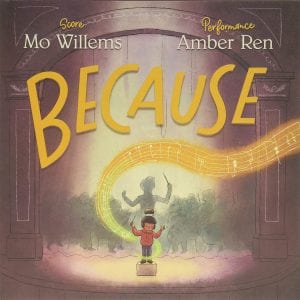
The cover of the 2019 Mo Willems children’s book, “Because.”
Inspired by the 2019 children’s book of the same name, Zyla launched “Because” in early March, with new episodes released every other Monday, peeling back the curtain on the classical music world.
A friendly 35-year-old native of Parkersburg, W.Va., he plays principal horn with the QCSO, as well as working as director of education and community engagement, and is the orchestra personnel manager.
“What you need to know about this show is that it’s very geared towards answering the question of, why do people do what they do and how do people do what they do?” Zyla said Monday, noting his first two guests were his father Luke (second horn in the West Virginia Symphony, where he’s played since 1979), and QCSO conductor and music director Mark Russell Smith.
Upcoming episodes will feature:
- April 5: Simon Woods, president/CEO of the League of American Orchestras.
- April 19: Janis Sakai, QCSO associate principal 2nd
- May 3: An “amazing special guest” (TBA)
- May 17: Ernesto Estigarribia, music director of the Quad City Symphony Youth Ensembles.
Zyla – who’s been principal horn in the QCSO since 2011 — earned a bachelor’s in music from West Virginia University and his master’s from Carnegie Mellon University. He got the inspiration for the new podcast from strolling the magazine and book aisles at Target.
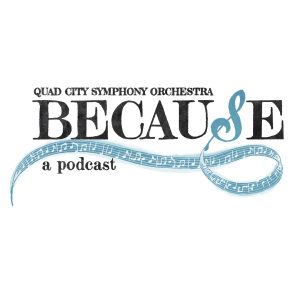
The Quad City Symphony’s new podcast, “Because,” releases a new episode every other Monday. The next new one will be April 5.
“The picture on the front cover caught my eye, which is a picture of a girl standing on a podium and conducting and there’s like music notes all over it,” Zyla said of “Because” by Mo Willems (a New York Times best-selling author and illustrator) and its powerful symphony of chance, discovery, persistence, and magic in a moving tale of a young girl’s journey to center stage.
“So I pick the book up and read it really quick in the aisle,” he recalled. “I like cry in the middle of Target; it has just such a beautiful story and I reacted to it.”
In the story, someone has to give up two seats to a symphony concert to a mother and daughter because of illness. “Because those tickets were passed off, they were able to go to the concert,” Zyla said. “Because there are musicians, there could be a concert. Because there’s a conductor, because there are ticket takers. Because they’re this and because they’re that.
“So it examines in a way that I’d not seen in a book before, all the things that need to happen for these concerts to occur — for this inspiration to happen and at the end of the story, because of this concert, and because of the support that this girl had from her family, she was able to become a conductor and composer herself.”
For Zyla, that message is what the podcast (aimed at a national audience) is meant to be.
“It’s like, let this book be a metaphor to find out what are the things that happened in order to get the ball rolling on somebody’s career, that
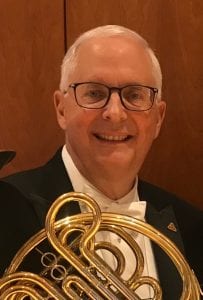
Luke Zyla has performed second horn with the West Virginia Symphony since 1979.
allows them to do what it is that they’re doing,” he said.
So it was natural for Zyla to start the show with his dad, to tell his “Because” story.
“We used my dad as a way to have listeners who don’t know me, kind of get to know my ‘Because’ story through my dad, because he is actually responsible for setting me on the path to be where I am right now,” Zyla said. “He is a huge part of my ‘Because’ story and I thought it would be good because you get to know him, but you kind of get to know who I am through that conversation.
“And my dad started me on horn when I was 5 and he was my teacher until I was a teenager,” he said. “He guided me through choosing colleges. He’s the person I called to celebrate when I won an audition. He’s the person that helps me consider what my next moves are. I mean my dad’s a huge part of my ‘Because’ story, but having him on the first episode was cool for me and a cool examination of who the host is for anybody who doesn’t know me already.”
While each of the first two episodes was more than 80 minutes long, Zyla said most will average about an hour.
One of the main things he wants to accomplish in “Because” is to counter the narrative that the music world presents performers as if they were born at their current state of greatness. Zyla wants to have musicians (and others involved with music) talk about their beginnings and how they got where they are.
“The concertgoers in the Quad-Cities, they’re just amazed by the musicianship of Mark Russell Smith and his ability to lead an orchestra and all those kinds of things,” he said. “We forget the amount of work that it takes to take that talent, to take that desire and mold it into what it is on stage. And so, I’ve always been fascinated by those stories as an individual.
“Now that I have a podcast, that goal is to kind of explore the people, places and things that had to occur for these things to result, which is interesting and inspiring I hope to the listener,” Zyla said.
At the end of each episode, he asks listeners to think about who are the people in their lives that have served in those invaluable roles of support, motivation and inspiration.
“I’ve just had such a wealth of support from individuals throughout my life and all of my guests,” Zyla said. “The world would be a better place if we all just went out there and tried to support one another and in the end, things that we love and the things that we’re passionate about.”
“It’s like, I really dig this thing that you’re up to. It doesn’t have to be music and I don’t even have to understand it,” he said. “But the fact that another human being is passionate about it is exciting to me.”
Smith’s ‘Because” story in Phoenix
Mark Russell Smith, QCSO conductor and music director since 2008, fittingly spoke of his mother (who died at 86 this past July) on the
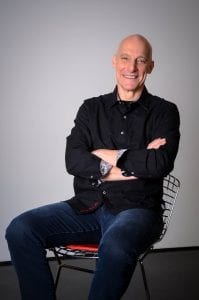
Mark Russell Smith is conductor and music director of the Quad City Symphony Orchestra.
podcast, and his boyhood in Phoenix, Ariz. His mom was a longtime church organist and elementary school music teacher. Smith’s parents divorced when he was in 6th grade and his stepfather passed away in 2003.
Zyla said on the podcast the only time he met the conductor’s mom, Hazel, was after the special 2015 QCSO concert with superstar cellist Yo-Yo Ma, who performed the Dvorak Cello Concerto in B minor with the orchestra to cap its 100th season.
“She was just very proud of her son,” Zyla told Smith recently. “It was abundantly clear that your mother was very, very proud of who you are and what you’ve become.”
Smith said after his stepfather’s death, his 70-year-old mom moved in with him and his family in suburban Minneapolis, and became “the rock on which the Smith family was built.” She was always there for him, his wife and two sons. “Our household and our lives could not have been the way they were without my mom,” he said.
While her death last July 21 was huge, Smith was incredibly grateful that they were locked down together at home, and they spent “the last months of her life in intimate contact, and without concerts.”
“That was in retrospect, a unique time and a silver lining in all this horrible Covid stuff,” Smith said. His confidence stemmed from her love and belief in him.
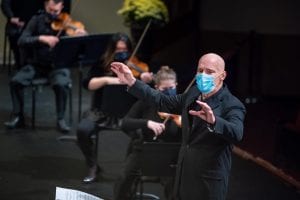
Mark Russell Smith conducting a distanced QCSO at the Adler Theatre.
His biological father was music director of Phoenix Boys Choir for 40 years. “In many ways, I’m very much like him,” Smith said on the podcast. “He was a conductor, a choir conductor, started out teaching elementary school.”
His main job was conducting a community college choir. “He was a very charismatic guy,” Smith said, noting he wasn’t as close to him as to his mother.
As a boy, he had a wide-ranging musical training, singing in different languages, helping at church. “That’s why I have the ear that I do; when I was 8 years old, I was singing in the Phoenix Boys Choir, making harmonies,” Smith said. “I could do all the hard parts. It was tremendously great training.”
“I was really grateful that early on, I had that musicality and those kind of things instilled in me,” he said. His school district in Phoenix had a great string program, led by the assistant principal cellist of the Phoenix Symphony, and his mom was the general music teacher for the
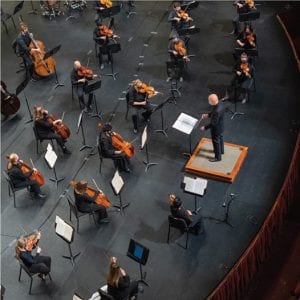
Mark Russell Smith leading a distanced Quad City Symphony at the Adler.
district.
Smith’s older brother played viola, and when he was in 3rd grade, Mark joined the program and picked cello because he loved the sound. The head of the program gave him private lessons.
Zyla asked what a normal day for teenage Mark Russell Smith was. He played varsity basketball, was drum major in the band, and senior year, he was student body president.
“I really didn’t practice the cello that much in high school,” he said. “I slid by on talent. I was in All-State; I was achieving. What I didn’t do – much to my teacher’s chagrin – was put the hours in to develop a technique.”
Smith had years of make-up work to do in college, which he did. His high school was crazy nonstop with activities, like his mom in her school and church work. His stepdad, who was a businessman, was like “Who are you people?” Smith recalled. “He just enjoyed watching everything fly by.” He and his mom thrived on that, being overbooked.
Smith said his stepfather had a beautiful singing voice and also was very supportive, coming to all his basketball games. “He was such a different person – he wasn’t a musician, he was a business guy, had different priorities.”
Zyla thought his early upbringing by musical parents, both teachers and great musicians, directly led to Smith’s prestigious career.
Smith didn’t know how to train to be a conductor. “I had this vague idea about Juilliard, the name everyone knows about,” he said.
He thought if you wanted to be good conductor, he had to be a good cellist. “You need a bunch of experience – you need to play in orchestra.
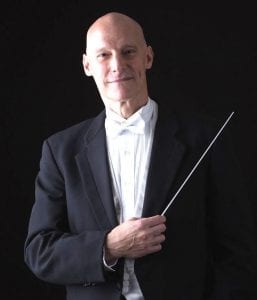
Smith (who earned degrees at Juilliard and Curtis) has led the QCSO since 2008.
You need a background before you can stand on a podium,” he said. “For whatever reason, I had it in my head, you need to be a really good cellist before you could be a good conductor.”
Smith didn’t get into any major conservatories, but was accepted at Northwestern, in Evanston, Ill. “It was a big wakeup call,” he said. “I didn’t feel like I was a failure I didn’t get into Juilliard. What was great about going to Northwestern – first was, performance on a very high level.”
Smith liked being in Chicago (his life changed going to the Chicago Symphony), he tested out of ear training and music theory came really naturally to him. “All of a sudden, this world I had grown up in since 3rd grade, there were labels for stuff. It was like mind-blowing, like I’m really good at this, but I didn’t know I was good at this. I didn’t know I had perfect pitch; didn’t know I knew so much about theory.”
“It was one kind of ‘a-ha’ moment after another,” he recalled. “That really gave me confidence.”
The world-class CSO literally changed Smith’s heart, he said, noting hearing towering symphonies by Mahler and Bruckner. “My heart would start beating out of his chest,” he said. “I had a physiological response to music, especially performances on that level. I will do whatever I have to do – I will work my ass off – to be able to make music like that. That’s something; that is life-changing.”
Smith practiced cello so much at Northwestern and studied at Aspen over summers. He transferred into Juilliard as a junior; and got to work with Leonard Bernstein. “New York to me, it was like a kid in a candy store,” Smith said.
He completed his undergrad degree in cello performance and earned his graduate degree in conducting from the Curtis Institute of Music in Philadelphia. Smith was first-prize winner in the National Repertory Orchestra Conductors Competition, and upon graduation, was named assistant conductor of the Opera Company of Philadelphia and the Philadelphia Singers. From 1989 to 1994, he went back to his roots to be associate conductor of the Phoenix Symphony.
For years, Smith has not only led the QCSO, but is artistic director of orchestral activities at the University of Minnesota and artistic director of Greater Twin Cities Youth Symphonies. Like Zyla, his wife Ellen is a horn player with the Minnesota Orchestra.
Pivoting since the pandemic
Heading up the QCSO’s community outreach, Zyla has seen plenty of positive opportunities since the Covid pandemic. Though last spring’s
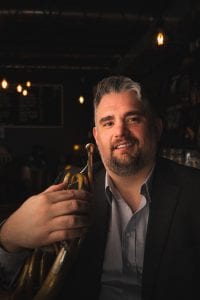
Marc Zyla has been principal horn with the Quad City Symphony since 2011.
Masterworks concerts were canceled, the orchestra rebounded and has presented a slew of concerts in 2020-21 both with in-person audiences and virtually – reaching many more people than they could pre-Covid.
“What I have learned is that finding as many ways as possible for us to engage with people is important,” Zyla said, noting QCSO digital access gives people up to 30 days to view each concert online. The “Concert Conversations” (in the past presented in person before each concert) with Smith and Kai Swanson are also available online and as a podcast.
“We’ve seen a huge increase in the amount of engagements that we can make with digital versions of our concerts,” Zyla said. “In our pre-Covid season, we invited school music programs to come to our concerts free of cost, through Students @ Symphony, and the schools that are able to travel to the concert. We’re taking

Future podcast guest Simon Woods is president/CEO of the League of American Orchestras.
advantage of that and we were getting a great return in terms of number of people in the concert hall. But when you get digital version of it, and then teachers can use that concert for the next 30 days in their classroom to support their classroom teaching.”
For its 2019-20 season, the QCSO welcomed 1,400 students and their parents into concerts via Students@Symphony, whereas this season teachers have registered 22,560 students to give them online access to Masterworks performances, he said.
“We’ll see all of that kind of stuff in a post-pandemic world and it’s an exciting part of my role to be able to produce this podcast as an effort to diversify the amount of ways people can engage with us,” Zyla said. “I think that it’s also something that other organizations are doing the same
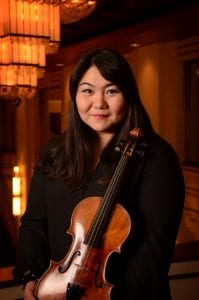
Future podcast guest Janis Sakai is the associate principal 2nd violin for the QCSO.
and if that organization is not, they will be thinking about this very soon.”
In a national survey on the impact Covid-19 from the League of American Orchestras (of 198 responding orchestras), just 23 percent of all groups are providing concerts with live, in-person audiences – as the QCSO has continued with the March Masterworks. More than one-quarter of all orchestras are not doing any concerts, in-person or virtually, the March results found.
“I am unbelievably grateful to the Quad City Symphony and to my colleagues for us finding a way to continue to play together this year,” Zyla said Monday. “Playing a concert for no one is weird; playing a concert for a limited live audience also — it’s exciting to see people in the hall again, but it’s still a little bit of a strange experience in comparison to what it was like to play before the pandemic where you have a lot of people.”
Limited capacity audiences were allowed in person for the QCSO for concerts earlier this month, and the next program April 10 (at 2 p.m. and 7:30 p.m.), with patrons having the option of getting digital access for 30 days. The March concert is available online until April 6.
“I really look forward to seeing all people back in the fall and feeling that feeling of having this big communal experience in the Adler Theatre and Centennial Hall,” Zyla said. “I’ve missed that the communal nature of performances. I miss seeing people at the Blackhawk after Saturday night performances.
“I look forward to that. That’s been the biggest thing that I’ve missed this year,” he said.
Since middle school, Zyla has never missed a steady schedule of orchestra performances.
“If that was completely gone, I don’t know where I’d be,” he said. “In essence, I cannot express how grateful I am that we were able to do it.
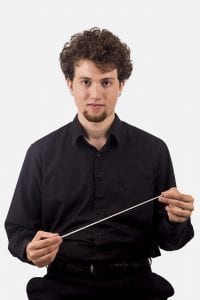
Future podcast guest Ernesto Estigarribia is music director of the Quad City Symphony Youth Ensembles.
It’s not how I prefer to do things, but it’s definitely it’s been wonderful to continue to play together and to play for people when they can come.”
The QCSO’s mission is more than producing great music in concert, including music education and outreach to the community, where Zyla’s mission is focused.
“I believe that the concert experience is unique. And I believe that the orchestra’s role is to make sure that that communal concert experience is available to every single person within the community from here until the end of time,” he said.
“But if you cannot bring somebody into the concert hall for the laundry list of reasons that you and I could come up with, having something digital is important and I think that it’s without a doubt that more students have heard a fully professional orchestra performance this year,” Zyla said.
“This organization is also very committed to continuing to produce educational digital products, so teachers and students have access to what it is that this organization can provide,” he said. “The classical music organization is not just about Beethoven and Mozart, but it’s about teaching people how to play music. It’s about exploring composers and genres that we may not have heard before.”
The QCSO serves the public not just in the concert hall, but wherever it can connect with people – in their homes, at lessons, or at any mobile device, Zyla said.
“We’re about being a part of your life, whatever level you’re comfortable and we hope that as you continue to engage with us, you see more and more possibilities for yourself being engaged in what it is that we’re doing — whether that’s playing music or listening to music,” he said.
You can check out the “Because” podcast HERE.



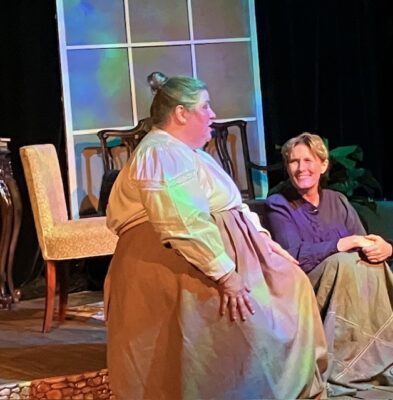









Leave a Reply
You must be logged in to post a comment.